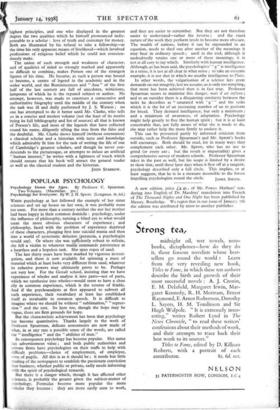POPULAR PSYCHOLOGY
Psychology Down the Ages. By Professor C. Spearman. Two Volumes. (Macmillan. 3os.)
Psychology for Everyone. By W. J. H. Sprott. (Longman. 8s. 6d.)
WHEN psychology at last followed the example of her sister sciences and set up house on her own, it was probably none too soon. For more than a century neither she nor her mother had been happy in their common domicile : psychology, under the influence of philosophy, turning a blind eye to what would seem the more obvious characters of experience ; and philosophy, faced with the problem of experience deprived of these characters, plunging first into suicidal mania and then into a world of systematic delusion (paranoia, a psychologist would say). Or where she was sufficiently robust to refrain, she fell- a victim to whatever mama commands persistence at a heartless and a hopeless task. She span ropes of sand.
The last thirty years have been marked by vigorous investi- gation, and there is now available for spinning a mass of material which at least looks very different from sand, whatever its cohesive powers may ultimately prove to be. Perhaps not very low. For the Gestalt school, insisting that we have experience of wholes and analyse it into parts—not of parts, which we synthesise into wholes—would seem to have a close ally in common experience, which is the reverse of friable. And if the psychoanalysts at first appeared to subvert all such experience, their vocabulary at least has established itself as invaluable to common speech. It is difficult to imagine where we should be without " sublimation," " repres- sion " and the rest. So here too, though the hope may be vague, there are firm grounds for hope.
But the characteristic achievement has been that psychology has become quantitative. Thanks largely to the work of Professor Spearman, delicate assessments are now made of what, in at any rate a possible sense of the words, are called the " intelligence " and the " abilities of man " In consequence psychology has become popular. Her name has advertisement value ; and both public authorities and private firms have psychologists on their staffs to help with difficult problems—choice of employment, of employee, even of pupils. All this is as it should be ; it needs but little reading of the newspapers to establish the passionate conviction that business, whether public or private, sadly needs informing with the spirit of psychological research.
But there is a danger which, though it has affected other sciences, is probably the greater given the subject-matter of psychology. Formulas - become more popular the more concise they become : they are more easily seen to work, and they are easier to remember. But they are not therefore easier to understand—rather the reverse ; and the exact nature of the work they perform tends to become more obscure. The wealth of nations, before it can be expounded in an equation, needs to shed one after another of the meanings it may bear in ordinary speech ; until in the end, although it undoubtedly retains one or more of these meanings, it is not at all easy to 'say which. Similarly with human intelligence. Although, as has been said, the psychologists' " g " is intelligence in a sense, it is not at all clear in what sense ; to take an extreme example, it is not that in which we ascribe intelligence to Plato.
In other words, the vulgarisation of a science lays great demands on our integrity, lest we assume, as is only too tempting, that more has been achieved than is in fact true. Professor Spearman seems to minimise this danger, mais it est orfevre ; and to an outsider there is a disquieting similarity between the tasks he describes as " saturated with ' g' " and the tasks which it is the lot of an increasing number of us to perform for bread. They demand intelligence, but only a minimum ; and a minimum of awareness, of adaptation. Psychology might help greatly to free the human spirit ; but it is at least conceivable that, not fully aware of what she is made to do, she may rather help the more firmly to enslave it.
This can be prevented partly by informed criticism from outside, such as Professor Spearman's and Mr. Sprott's books will encourage. Both should be read, for in many ways they complement each other. Mr. Sprott, who has no axe to grind (or every axe ; but the result is impartiality) gives a comprehensive survey of modern schools. Professor Spearman takes in the past as well, but his scope is limited by a desire to show that, until these later days when it flew off at a tangent, psychology described only a full circle. This implies, or at least suggests, that he is in a measure insensible to the forces impelling psychologists round the circle. JAMES SMITH.






































 Previous page
Previous page